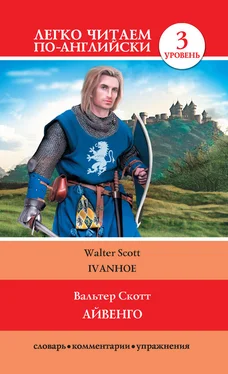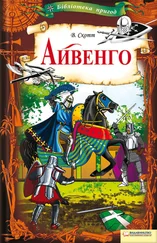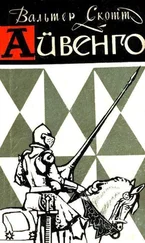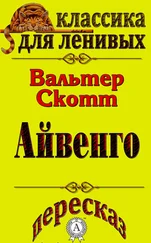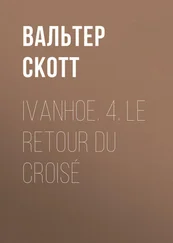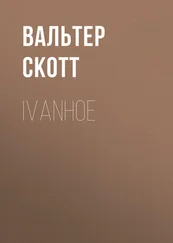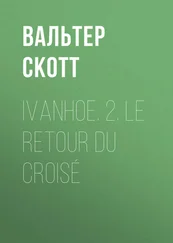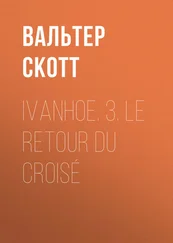This was the end of the first day of the tournament.
* * *
The Disinherited Knight had only one squire. This man helped his master to take off his armour, and placed food and wine on the table before him.
The Knight had not finished eating, when his servant told him that five men wanted to speak with him. The Disinherited Knight pulled the hood of his cloak over his head to hide his face and went out of his tent. The five men were squires of the challengers, each holding his master’s horse loaded with the armour in which he had fought that day.
“According to the laws of knights,” said the first of these men, “I, Baldwin de Oyley, a squire of Brian de Bois-Guilbert, offer you the horse and armour used by Brian de Bois-Guilbert in this day’s tournament, leaving it with your nobleness to keep it or to take the same sum in money.”
The other squires repeated the same formula, and then stood waiting for the decision of the Disinherited Knight.
“To you four, sirs,” replied the Knight, addressing those who had last spoken, “and to your honourable and brave masters, I have one common reply. Send my compliments to your masters and tell them that I ask them to pay for their horses and armour.”
“We offer you, each of us,” answered the squire of Reginald Front-de-Boeuf, “a hundred golden coins in ransom of these horses and suits of armour.”
“It is enough,” said the Disinherited Knight. “Half the sum I need to accept, and from the remaining half, distribute one part among yourselves, my squires, and divide the other half between the heralds and the servants.”
The squires bowed and thanked the knight for his generosity. The Disinherited Knight then addressed Baldwin, the squire of Brian de Bois-Guilbert. “From your master,” said he, “I will accept neither arms nor ransom. Say to him in my name, that our fighting is not ended—no, not till we have fought with swords as well as with lances—on foot as well as on horseback. To this mortal quarrel he has himself challenged me, and I will not forget the challenge.”
“My master,” answered Baldwin, “will never use this horse or this armour again.”
“Don’t leave them here, take them for your own use then, they are yours.”
Baldwin bowed and left with his companions, and the Disinherited Knight entered the tent.
“Thus far, Gurth,” he said to his servant, “the reputation of English knights has not suffered in my hands.”
“And I,” said Gurth, “for a Saxon swineherd, have well played the role of a Norman squire.”
“Take this bag of gold to Ashby,” said his master, “and find Isaac the Jew of York. Pay him for the horse and arms with which his credit supplied me. And here are ten coins for yourself.”
Gurth thanked his master and left him to his thoughts.
When Gurth came to Isaac’s house in Ashby, a servant let him in. Isaac and his daughter were sitting in a room decorated in the Eastern fashion.
The door opened, and Gurth entered.
“Are you Isaac the Jew of York?” said Gurth, in Saxon.
“I am,” replied Isaac, in the same language, – “and who are you?”
“It doesn’t matter,” answered Gurth, “I bring money from the Disinherited Knight.” It is the price of the armour Kirjath Jairam of Leicester supplied to him on your recommendation. The horse is returned to your stable. I want to know the amount of money which I am to pay for the armour.”
“I said he was a good man!” exclaimed Isaac joyfully. “A cup of wine will do you no harm,” he added, filling and handing to the swineherd a cup of very expensive wine. “And how much money,” continued Isaac, “have you brought with you?”
“A small sum.”
“Well, then”—said Isaac, hesitating between his love of money and a new desire to be generous, “if I should say that I would take eighty golden coins for the good horse and the rich armour, do you have enough money to pay me?”
“Barely,” said Gurth, though the sum demanded was more reasonable than he had expected, “and it will leave my master almost without money. Nevertheless, if this is your demand, I must be content.”
“Fill yourself another cup of wine,” said the Jew.
Gurth put eighty coins upon the table. The Jew’s hand trembled with joy when he counted his eighty pieces of gold.
“I believe you have more coins in that bag,” he added.
Gurth smiled when he replied, “About the same amount that I have paid you.” He then drank a third goblet of wine without invitation and left the apartment.
When Isaac turned to speak to his daughter, he saw that she had left the apartment.
In the meanwhile, Gurth had reached the hall but was not sure where the door was. At this moment a figure in white with a small silver lamp in her hand asked him to come to another room. Gurth hesitated, then followed his guide to another room where he found to his surprise and relief that it was the daughter of the Jew.
She asked him how much he paid Isaac. He answered.
“My father, good fellow,” said Rebecca, “owes your master for his kindness much more than these armour and horse could pay. In this purse you will find a hundred golden coins. Give to your master eighty and take the rest for yourself. Go now, be careful on the road at night.”
“By St Dunstan, [19]” said Gurth, as he stumbled in the dark, “this is not a Jewish maiden, she is an angel from heaven! Ten golden coins from my brave young master—twenty from this pearl of Zion—Oh, a happy day! – One more day like this and I will buy my freedom. [20]”
* * *
The adventures of Gurth did not end. When he left the village, he found himself on a dark road. The trees on both sides caught the light of the harvest moon. Gurth began to walk faster but it didn’t save him. Four men suddenly jumped on him, two from each side of the road, and seized him so fast, that he wasn’t able to resist. “Surrender,” said one of them, “we are your saviors, we will save you from your money.”
Gurth was dragged through the forest and then to an open space which was lighted by the moon. Here the robbers were joined by two other persons, apparently belonging to the band. Each had a short sword and a staff, and Gurth could now observe that all the six wore masks.
“What money do you have?” said one of the thieves.
“Thirty coins of my own property,” answered Gurth.
“He should lose it!” shouted the robbers; “a Saxon has thirty coins, and returns from a village without getting drunk! He should lose all he has.”
“I kept it to buy my freedom,” said Gurth.
“You are a fool,” replied one of the thieves “three cups of ale would make you as free as your master.”
“A sad truth,” replied Gurth, “but if these same thirty coins can buy my freedom from you, let me go and I will pay them to you.”
“Hold,” said one who seemed to be the leader, “this bag which you have, as I can feel through your cloak, contains more coin than you have told us.”
“It is my master’s,” answered Gurth, “about which I would not have spoken a word, had you been satisfied with taking my own money.”
“You are an honest fellow,” replied the robber, “and your thirty coins may yet escape, if you don’t lie to us.” So saying, he took from Gurth’s breast the large leathern bag, in which was the rest of the money, and then continued his interrogation. – ”Who is your master?”
“The Disinherited Knight,” said Gurth.
“Whose good lance,” replied the robber, “won the prize in today’s tournament? What is his name and lineage?”
“He wants,” answered Gurth, “to keep them in secret.”
Читать дальше
Конец ознакомительного отрывка
Купить книгу
